Strictly Personal
Suddenly, I felt empty without my mobile phone by Ehi Braimah
Published
2 years agoon
Family, friends and associates gathered last Thursday at Hillcrest Event Centre in Okota, Lagos, for the service of songs in honour of Dr. Emmanuel Sunny Ojeagbase — popularly known as SO to his media colleagues — who passed away in Atlanta, Georgia in the United States on February 26.
Before the service began, I met top sports journalists, Larry Izamoje and Isaac Ibhafidon. There were other former colleagues who bantered with each other and we used the opportunity to play catch up. I was a former employee of Complete Communications Limited, courtesy of SO’s large heart and kindness before I moved on to other responsibilities.
The service of songs was right on schedule at 4.00pm. Later, my wife joined me from her cousin’s event which was held at Ire-Akari Estate – a shouting distance away. By the time the service ended two hours later, it was time to share more banters with familiar faces that included Segun Odegbami, Mike Awoyinfa, Dada Ajai-Ikhile, Franklin Ilaboya, and members of the Ojeagbase family.
I took one of my phones containing my MTN and 9mobile numbers with me into the hall but the last thing on my mind was that the phone would be stolen by a pickpocket. Taking the phone with me turned out to be a costly mistake. I’m usually never in the habit of taking my phones with me to such places – not even when I attend church services; I keep the phone far away from me. My attitude is that all calls and messages can wait — for a few hours. After all, we survived when we didn’t have mobile phones.
Personally, I do not believe it is a good idea to take the mobile phone or tablet into the church, a place of worship where we should reverence God in all his holiness. But again, you cannot really fault those who do so because we are in the tech age where the digital version of the bible – one of the apps downloaded from Google Play or the app store – is stored on those devices.
I have never lost a phone since 2001 when the mobile telecommunications revolution began. You can lose a phone or it can be stolen – they don’t mean the same thing. Once I have used a phone for about three to four years, I get another one and pass on the old handset to the next lucky beneficiary.
But this time, I lost my Samsung mobile phone to a thief immediately after the service of songs ended. These thieves are at every event – birthdays, weddings, services of songs, worship centres, and so on. Most of the time, they appear like “important” guests, uninvited but well dressed for the occasion; they are criminals going after the personal effects of invited guests.
Unfortunately, CCTV cameras are not installed in most of these venues by the owners. Masters of ceremony at such functions and social events should constantly remind their audiences to secure their mobile phones and other personal effects from the prying eyes of misbegotten gatecrashers and thieves at these parties.
Why did I take my mobile phone with me into the hall? Well, let us just say that I broke one of my “fundamental rules” and paid dearly for it. But you cannot blame me because I was expecting my wife to call me as soon as she arrived at the venue from her cousin’s place. And she did and joined me after I told her where I was sitting in the hall. It was the last call I received before the phone was stolen.
I was careless to have left the phone inside the left pocket of my Ankara attire, the one Yorubas call Buba and Sokoto. It was inside the left pocket of my Buba. Throughout the service, I knew the phone was with me. But when the service ended, I only took a few steps to exchange pleasantries when, instinctively, I reached out for my phone but it was gone and switched off by the thief.
“Is my phone with you,” I asked my wife, half-heartedly, to be sure even when I could recollect I never gave her the phone. At this time, Tajudeen, our driver, had the takeaway hospitality packs with him. “Please check the packs,” my wife, who was still in shock, instructed Tajudeen just to erase every doubt.
The phone was nowhere to be found. I was confused. Before we left the venue, I told Mumini Alao, Julius Ojeagbase and Thomas Ayodele, my former colleagues at Complete Communications, that my phone had been stolen. The mood changed and feelings of sympathy were expressed. Mumini, Thomas, and I still relate very well as brothers and we stay in touch regularly.
I was initially angry with myself for my carelessness and I became distraught because I knew the inconveniences that would follow retrieving the lines. Although she was feeling bad, my wife pleaded that I should not be too hard on myself. “Don’t worry, you will get another phone tomorrow,” she assured me, trying to calm my nerves. It turned out that the thieves also stole mobile phones belonging to other guests; I was not the only victim.
Throughout the journey from Okota to Ikeja, I was unhappy for being a victim. It could have been avoided. In my reckoning, the effort was like a stroll in the park for the pickpocket. My second mobile phone – containing Glo and Airtel lines – was in the car. But my MTN line that is as old as the network is my mobile office; if you get my drift. All the relevant apps are stored on the phone.
When MTN marked its 10th anniversary, I was honoured as a valued customer with gifts and a carefully worded “Thank You” letter, an exercise that I ranked as excellent public relations. MTN has continued on that path to this day.
My first mobile phone handset ever was the famous and sturdy Nokia 3310. Do you still remember the popular and iconic ring tone booming from the handset each time it rang? It was a phrase from ‘Grand Vals’ (12 – 14 secs), a Spanish classical song composed by guitarist and musician Francisco Tarrega. Well, that was back in the day –- 21 years ago.
Suddenly, I did not have access to WhatsApp which meant that I could not chat, send or receive messages. WhatsApp, as we all know, is a versatile and robust medium of communication for everyone, no matter the person’s status. WhatsApp is a fast, sure and real-time platform for engagement and conversations by individuals and groups — as long as they have access to the internet.
WhatsApp is owned by Facebook, now Meta. Mark Zuckerberg, chief executive of the company in his expansionist drive, acquired WhatsApp. Computer engineers Brian Acton and Jan Koum were young college students in their 30s but cofounded messaging application, WhatsApp, in 2009. They met previously at Ernst & Young, and much later at Yahoo! where they worked together. Acton and Koum launched the app five years after Zuckerberg created Facebook on February 4, 2004.
Then on February 19, 2014, Facebook announced it was acquiring WhatsApp when it was five years old for US$22 billion in cash and stock – its largest purchase to date. Facebook is also the owner of Instagram which the company bought for US$1 billion 18 months after IG was launched.
It is not always a good experience when mobile phones are stolen because of our emotional attachment to the phones. For several reasons, your mobile phone is your companion and personal assistant because the phone is always with you wherever you go. When it is stolen or whether you declare it missing, you instantly feel that a part of you is missing – that sense of loss surrounds you and literally eats you up as if oxygen is draining out of your body.
The phone can be a major source of distraction but can we do without it? According to the Nigeria Communications Commission (NCC), there are over 198 million mobile (GSM) active lines in Nigeria which translate into a huge pot of gold for the telecoms operators. Internet penetration is understandably massive in Nigeria and the numbers keep growing each year. MTN, Glo, Airtel and 9mobiles are the main players in the sector and I’m a customer of the four networks.
Semiu Okanlawon, a journalist and media consultant, said we have a “spiritual connection” to our mobile phones. “It is like owning a dog which is showered with a lot of affection as if it were a human being,” Semiu told me the day after my phone was stolen.
He had a similar experience in Iwo, Osun state, at the wedding reception of his niece but the story of Michael Effiong James, editor of Ovation International magazine, was different. “Instinctively, I felt emptiness around me,” Semiu remembered after a pickpocket stole his phone. He had also placed the phone inside the left pocket of his Buba but he was lucky to have apprehended the thief who was given the beating of his life by angry bystanders.
Michael was unlucky in his encounter with men of the underworld but he is lucky to be alive. After taking him around Lagos for more than four hours in the dead of the night as if it was a James Bond movie, the Ovation editor lost his car, cash, laptop and mobile phone to the armed robbers.
The interesting thing was that he found his phone when the police stepped into the matter. His car was also recovered. Mike told me he was mightily impressed with the police for their professional and thorough investigation. With the help of technology, most of our teething problems can be solved. Mike’s phone was tracked by the police using the IMEI code and the thief or receiver of the phone was caught. It will work for you if you are able to store the code in a safe place. In my case, I did not but it is a useful lesson.
In truth, it is difficult to shake off the mobile phone and pretend as if it is not important. When you are without your mobile phone or if the battery is flat because you are unable to charge it, you actually feel like a fish out of water.
In my own case, I’m completely cut off from the rest of the world but I have had to fall back on my Glo and Airtel lines since last Thursday. When I visited the Friendship and Customer Care Centres of MTN and 9mobile the next day and Saturday, I could not retrieve my lines because the National Identity Management Commission (NIMC) portal was down.
If it is a new sim card, registration can be done offline but you would have to wait for at least 72 hours for the line to be fully activated through the NIMC portal. However, if it is an old sim card like mine, the number must be re-validated on the NIMC portal before a sim swap can be enabled.
For security measures, please ensure that your mobile phone is passworded with a mix of numbers and alphabets, finger print or facial recognition. You should also password your WhatsApp and bank apps where it is applicable. Once your phone is stolen, the first thing to do is block the numbers and go through the process of restoring them, but pray that the NIMC portal does not slow you down.
Even when you lose your phone, the good thing is that you can retrieve all your data and information if you stored them digitally in the cloud. Google, for example, provides secure and durable storage for free – but only up to a threshold after which you are required to pay for the service.
I must confess that the customer relations executives were very helpful. Rosemary, Tolu and Michael at MTN and the duo of Stanley and Adebola at 9mobile displayed excellent work attitude when I visited their Friendship Centres. I salute their cooperation, commitment and sense of industry.
My two lines should have been fully restored the next day – under “normal circumstances”. That was my expectation, but I was only able to activate the lines 72 hours after my phone was stolen. Until you are able to scale the NIMC portal hurdle for revalidation of your information, telecoms operators cannot proceed to the next stage in order to retrieve your telephone numbers.
Thankfully, the NIMC portal, with its “bi-polar behaviour” like the British weather, allowed for my sim swap and successful registration after several attempts by the dutiful MTN staff on Sunday.
Braimah is a public relations strategist and publisher/editor-in-chief of Naija Times (https://naijatimes.ng)
You may like
-


Air Peace, capitalism and national interest, By Dakuku Peterside
-


Off we go again with public shows, humbug and clowning, By Jenerali Uliwengu
-


How patriarchy underpins gender violence today, By Tee Ngugi
-


Help! There’s a dangerous, secret plot to save the EAC from imminent death, By Charles Onyango-Obbo
-


Village Capital launches Greentech 2024 for African startups
-
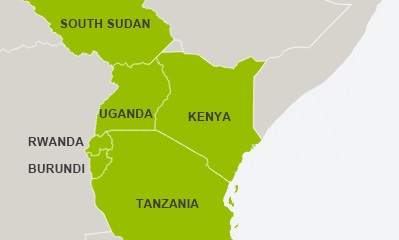

Our leaders need to develop an EAC character that abhors NTBs, By Joachim Buwembo
Strictly Personal
Air Peace, capitalism and national interest, By Dakuku Peterside
Published
1 week agoon
April 16, 2024
Nigerian corporate influence and that of the West continue to collide. The rationale is straightforward: whereas corporate activity in Europe and America is part of their larger local and foreign policy engagement, privately owned enterprises in Nigeria or commercial interests are not part of Nigeria’s foreign policy ecosystem, neither is there a strong culture of government support for privately owned enterprises’ expansion locally and internationally.
The relationship between Nigerian businesses and foreign policy is important to the national interest. When backing domestic Nigerian companies to compete on a worldwide scale, the government should see it as a lever to drive foreign policy, and national strategic interest, promote trade, enhance national security considerations, and minimize distortion in the domestic market as the foreign airlines were doing, boost GDP, create employment opportunities, and optimize corporate returns for the firms.
Admitted nations do not always interfere directly in their companies’ business and commercial dealings, and there are always exceptions. I can cite two areas of exception: military sales by companies because of their strategic implications and are, therefore, part of foreign and diplomatic policy and processes. The second is where the products or routes of a company have implications for foreign policy. Air Peace falls into the second category in the Lagos – London route.
Two events demonstrate an emerging trend that, if not checked, will disincentivize Nigerian firms from competing in the global marketplace. There are other notable examples, but I am using these two examples because they are very recent and ongoing, and they are typological representations of the need for Nigerian government backing and support for local companies that are playing in a very competitive international market dominated by big foreign companies whose governments are using all forms of foreign policies and diplomacy to support and sustain.
The first is Air Peace. It is the only Nigerian-owned aviation company playing globally and checkmating the dominance of foreign airlines. The most recent advance is the commencement of flights on the Lagos – London route. In Nigeria, foreign airlines are well-established and accustomed to a lack of rivalry, yet a free-market economy depends on the existence of competition. Nigeria has significantly larger airline profits per passenger than other comparable African nations. Insufficient competition has resulted in high ticket costs and poor service quality. It is precisely this jinx that Air Peace is attempting to break.
On March 30, 2024, Air Peace reciprocated the lopsided Bilateral Air Service Agreement, BASA, between Nigeria and the United Kingdom when the local airline began direct flight operations from Lagos to Gatwick Airport in London. This elicited several reactions from foreign airlines backed by their various sovereigns because of their strategic interest. A critical response is the commencement of a price war. Before the Air Peace entry, the price of international flight tickets on the Lagos-London route had soared to as much as N3.5 million for the economy ticket. However, after Air Peace introduced a return economy class ticket priced at N1.2 million, foreign carriers like British Airways, Virgin Atlantic, and Qatar Airways reduced their fares significantly to remain competitive.
In a price war, there is little the government can do. In an open-market competitive situation such as this, our government must not act in a manner that suggests it is antagonistic to foreign players and competitors. There must be an appearance of a level playing field. However, government owes Air Peace protection against foreign competitors backed by their home governments. This is in the overall interest of the Nigerian consumer of goods and services. Competition history in the airspace works where the Consumer Protection Authority in the host country is active. This is almost absent in Nigeria and it is a reason why foreign airlines have been arbitrary in pricing their tickets. Nigerian consumers are often at the mercy of these foreign firms who lack any vista of patriotism and are more inclined to protect the national interest of their governments and countries.
It would not be too much to expect Nigerian companies playing globally to benefit from the protection of the Nigerian government to limit influence peddling by foreign-owned companies. The success of Air Peace should enable a more competitive and sustainable market, allowing domestic players to grow their network and propel Nigeria to the forefront of international aviation.
The second is Proforce, a Nigerian-owned military hardware manufacturing firm active in Rwanda, Chad, Mali, Ghana, Niger, Burkina Faso, and South Sudan. Despite the growing capacity of Proforce in military hardware manufacturing, Nigeria entered two lopsided arrangements with two UAE firms to supply military equipment worth billions of dollars , respectively. Both deals are backed by the UAE government but executed by UAE firms.
These deals on a more extensive web are not unconnected with UAE’s national strategic interest. In pursuit of its strategic national interest, India is pushing Indian firms to supply military equipment to Nigeria. The Nigerian defence equipment market has seen weaker indigenous competitors driven out due to the combination of local manufacturers’ lack of competitive capacity and government patronage of Asian, European, and US firms in the defence equipment manufacturing sector. This is a misnomer and needs to be corrected.
Not only should our government be the primary customer of this firm if its products meet international standards, but it should also support and protect it from the harsh competitive realities of a challenging but strategic market directly linked to our national military procurement ecosystem. The ability to produce military hardware locally is significant to our defence strategy.
This firm and similar companies playing in this strategic defence area must be considered strategic and have a considerable place in Nigeria’s foreign policy calculations. Protecting Nigeria’s interests is the primary reason for our engagement in global diplomacy. The government must deliberately balance national interest with capacity and competence in military hardware purchases. It will not be too much to ask these foreign firms to partner with local companies so we can embed the technology transfer advantages.
Our government must create an environment that enables our local companies to compete globally and ply their trades in various countries. It should be part of the government’s overall economic, strategic growth agenda to identify areas or sectors in which Nigerian companies have a competitive advantage, especially in the sub-region and across Africa and support the companies in these sectors to advance and grow to dominate in the African region with a view to competing globally. Government support in the form of incentives such as competitive grants ,tax credit for consumers ,low-interest capital, patronage, G2G business, operational support, and diplomatic lobbying, amongst others, will alter the competitive landscape. Governments and key government agencies in the west retain the services of lobbying firms in pursuit of its strategic interest.
Nigerian firms’ competitiveness on a global scale can only be enhanced by the support of the Nigerian government. Foreign policy interests should be a key driver of Nigerian trade agreements. How does the Nigerian government support private companies to grow and compete globally? Is it intentionally mapping out growth areas and creating opportunities for Nigerian firms to maximize their potential? Is the government at the domestic level removing bottlenecks and impediments to private company growth, allowing a level playing field for these companies to compete with international companies?
Why is the government patronising foreign firms against local firms if their products are of similar value? Why are Nigerian consumers left to the hands of international companies in some sectors without the government actively supporting the growth of local firms to compete in those sectors? These questions merit honest answers. Nigerian national interest must be the driving factor for our foreign policies, which must cover the private sector, just as is the case with most developed countries. The new global capitalism is not a product of accident or chance; the government has choreographed and shaped it by using foreign policies to support and protect local firms competing globally. Nigeria must learn to do the same to build a strong economy with more jobs.
Strictly Personal
This is chaos, not governance, and we must stop it, By Tee Ngugi
Published
2 weeks agoon
April 10, 2024
The following are stories that have dominated mainstream media in recent times. Fake fertiliser and attempts by powerful politicians to kill the story. A nation of bribes, government ministries and corporations where the vice is so routine that it has the semblance of policy. Irregular spending of billions in Nairobi County.
Billions are spent in all countries on domestic and foreign travel. Grabbing of land belonging to state corporations, was a scam reminiscent of the Kanu era when even public toilets would be grabbed. Crisis in the health and education sectors.
Tribalism in hiring for state jobs. Return of construction in riparian lands and natural waterways. Relocation of major businesses because of high cost of power and heavy taxation. A tax regime that is so punitive, it squeezes life out of small businesses. Etc, ad nauseam.
To be fair, these stories of thievery, mismanagement, negligence, incompetence and greed have been present in all administrations since independence.
However, instead of the cynically-named “mama mboga” government reversing this gradual slide towards state failure, it is fuelling it.
Alternately, it’s campaigning for 2027 or gallivanting all over the world, evoking the legend of Emperor Nero playing the violin as Rome burned.
A government is run based on strict adherence to policies and laws. It appoints the most competent personnel, irrespective of tribe, to run efficient departments which have clear-cut goals.
It aligns education to its national vision. Its strategies to achieve food security should be driven by the best brains and guided by innovative policies. It enacts policies that attract investment and incentivize building of businesses. It treats any kind of thievery or negligence as sabotage.
Government is not a political party. Government officials should have nothing to do with political party matters. They should be so engaged in their government duties that they literally would not have time for party issues. Government jobs should not be used to reward girlfriends and cronies.
Government is exhausting work undertaken because of a passion to transform lives, not for the trappings of power. Government is not endless campaigning to win the next election. To his credit, Mwai Kibaki left party matters alone until he had to run for re-election.
We have corrupted the meaning of government. We have parliamentarians beholden to their tribes, not to ideas.
We have incompetent and corrupt judges. We have a civil service where you bribe to be served. Police take bribes to allow death traps on our roads. We have urban planners who plan nothing except how to line their pockets. We have regulatory agencies that regulate nothing, including the intake of their fat stomachs.
We have advisers who advise on which tenders should go to whom. There is no central organising ethos at the heart of government. There is no sense of national purpose. We have flurries of national activities, policies, legislation, appointments which don’t lead to meaningful growth. We just run on the same spot.
Tee Ngugi is a Nairobi-based political commentator
EDITOR’S PICK


Nigeria’s NGX Group enters into strategic investment partnership with Ethiopian Securities Exchange
Leading Nigerian integrated market infrastructure group in Africa, the Nigerian Exchange Group (NGX), has announced strategic investment in the Ethiopian...


Namibia govt condemns tourists posing naked on Big Daddy Dune
The Namibian authorities have frowned at tourists who posed naked at the Big Daddy Dune, the country’s top tourist attraction...
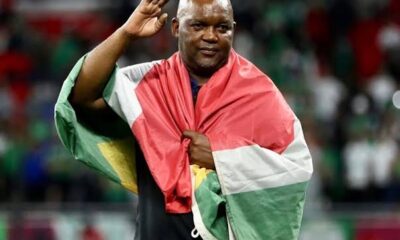

Domestic worker sues Pitso Mosimane, wife following debilitating injuries
Former Mamelodi Sundowns of South Africa and Al Ahli of Egypt coach, Pitso Mosimane, and his wife, Moira Tlhagale, have...


Media polarisation blamed for biased coverage, civil society leader calls for mindset shift
Chama Mwansa, Executive Director of the Chandarika Women and Youths Foundation, has attributed media biases to the similarities in coverage...


Nigeria: 118 prison inmates escape after rainstorm destroys facility
At least 118 inmates of the Medium Security Custodial Centre in Suleja, Niger State, in northern Nigeria, have reportedly escaped...


Tanzania’s auto-tech startup Spana is simplifying car maintenance— CEO
Tanzania’s auto-tech startup, Spana, has developed a mobile application for a bouquet of automobile services, enabling individual car owners and...


Nollywood thrown into mourning as another veteran actor Zulu Adigwe passes on
The Nigerian movie industry, popularly known as Nollywood, has once again been thrown into mourning with the death of veteran...


Zambian FA boss, Gen.Sec arrested over alleged laundering of K341,902
President of the Football Association of Zambia (FAZ), Andrew Kamanga, has been arrested along with the Secretary-General and two other...
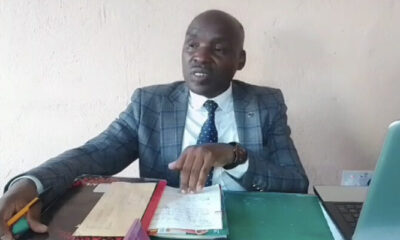

Luapula businessman, Munsanje, reflects on media freedoms and freedom of expression
As stakeholder engagement intensifies regarding the ongoing project to amplify voices on media freedom, freedom of expression, and digital rights,...


World Bank stops tourism fund to Tanzania’s Ruaha park. Here’s why
A spokesperson for the World Bank said on Wednesday that the lender had stopped all new payments from a $150...
Trending
-
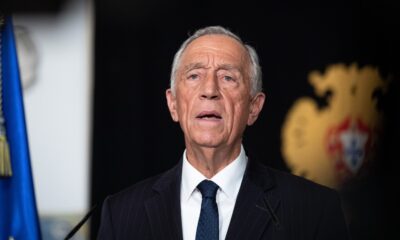
 Musings From Abroad1 day ago
Musings From Abroad1 day agoPresident de Sousa insists Portugal must ‘pay costs’ of slavery, colonial crimes
-

 Tech1 day ago
Tech1 day agoTanzania’s auto-tech startup Spana is simplifying car maintenance— CEO
-

 Culture1 day ago
Culture1 day agoNollywood thrown into mourning as another veteran actor Zulu Adigwe passes on
-
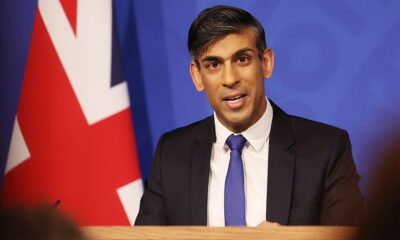
 Musings From Abroad1 day ago
Musings From Abroad1 day agoBritish PM Sunak remains adamant over migration deal with Rwanda


